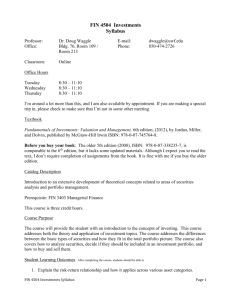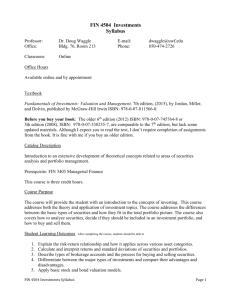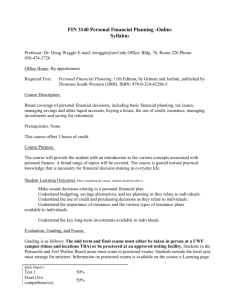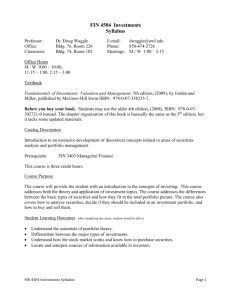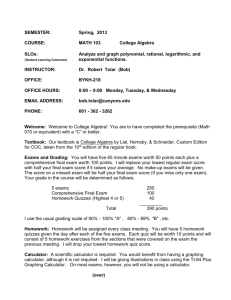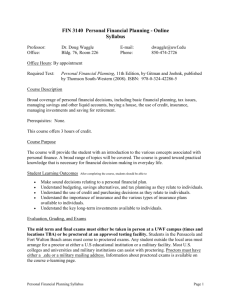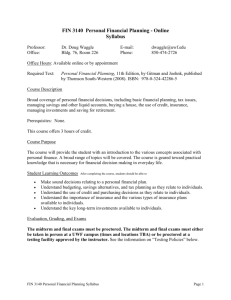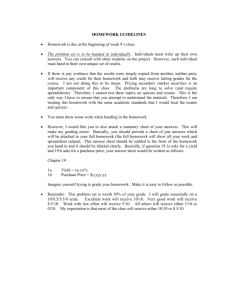Investments Syllabus - University of West Florida
advertisement
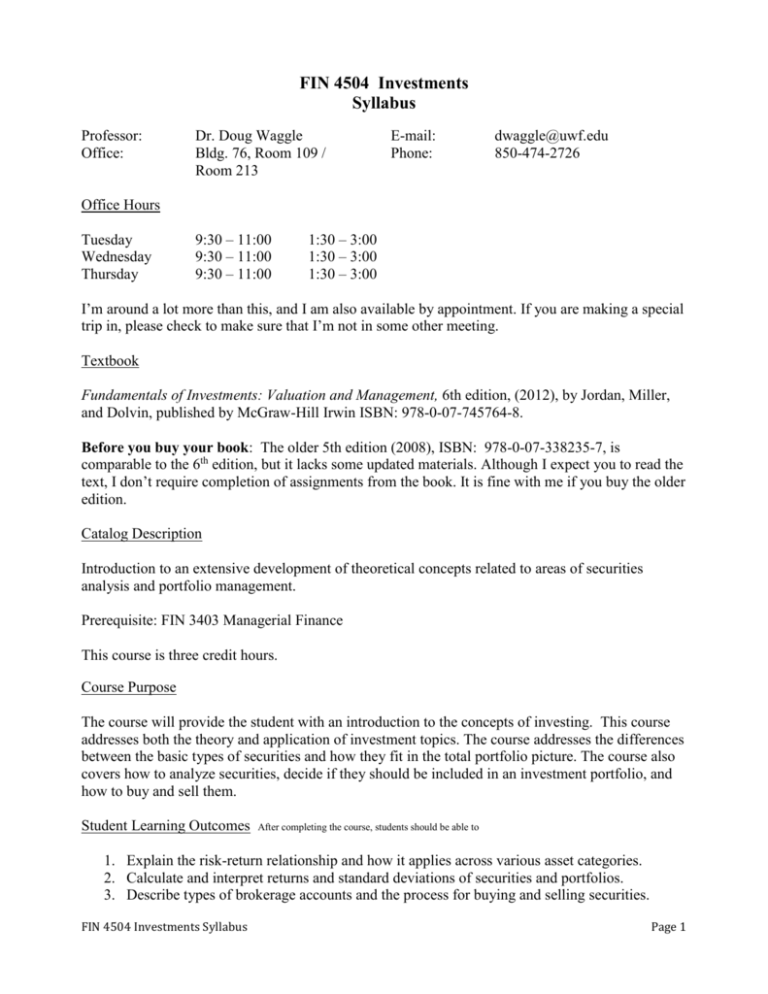
FIN 4504 Investments Syllabus Professor: Office: Dr. Doug Waggle Bldg. 76, Room 109 / Room 213 E-mail: Phone: dwaggle@uwf.edu 850-474-2726 Office Hours Tuesday Wednesday Thursday 9:30 – 11:00 9:30 – 11:00 9:30 – 11:00 1:30 – 3:00 1:30 – 3:00 1:30 – 3:00 I’m around a lot more than this, and I am also available by appointment. If you are making a special trip in, please check to make sure that I’m not in some other meeting. Textbook Fundamentals of Investments: Valuation and Management, 6th edition, (2012), by Jordan, Miller, and Dolvin, published by McGraw-Hill Irwin ISBN: 978-0-07-745764-8. Before you buy your book: The older 5th edition (2008), ISBN: 978-0-07-338235-7, is comparable to the 6th edition, but it lacks some updated materials. Although I expect you to read the text, I don’t require completion of assignments from the book. It is fine with me if you buy the older edition. Catalog Description Introduction to an extensive development of theoretical concepts related to areas of securities analysis and portfolio management. Prerequisite: FIN 3403 Managerial Finance This course is three credit hours. Course Purpose The course will provide the student with an introduction to the concepts of investing. This course addresses both the theory and application of investment topics. The course addresses the differences between the basic types of securities and how they fit in the total portfolio picture. The course also covers how to analyze securities, decide if they should be included in an investment portfolio, and how to buy and sell them. Student Learning Outcomes After completing the course, students should be able to 1. Explain the risk-return relationship and how it applies across various asset categories. 2. Calculate and interpret returns and standard deviations of securities and portfolios. 3. Describe types of brokerage accounts and the process for buying and selling securities. FIN 4504 Investments Syllabus Page 1 4. Differentiate between the major types of investments and compare their advantages and disadvantages. 5. Apply basic stock and bond valuation models. 6. Explain the reasons for buying mutual funds and ETFs. 7. Discuss the arguments for and against market efficiency in its various forms. 8. Compare technical and fundamental analysis. 9. Explain the benefits of diversification from both a practical and theoretical perspective. 10. Discuss and apply the basic result of the CAPM. 11. Demonstrate basic skills in solving financial problems using Microsoft Excel. Evaluation and Grading The three major exams must be proctored. The major exams must either be taken in person at a UWF campus (times and locations TBA) or be proctored at a testing facility approved by the instructor. See the information on “Testing Policies” below. Grades are calculated as follows: Exam 1 Exam 2 Comprehensive Final Exam Online Quizzes Excel Homework Total 24% 24% 28% 12% 12% 100% If you fall behind in the material, catching up may prove difficult. There are mandatory online quizzes that are designed to keep you on track. The quizzes are open book and open note, but they are timed and you must do them on your own. There will also be several Microsoft Excel assignments. Details of assignments and due dates will be provided. All homework and quizzes must be completed by their assigned due dates. No unexcused late work will be accepted. Failure to take a quiz or complete a homework assignment by the due date results in a grade of 0. Computer problems, Internet connection issues, and lost Excel files are not valid excuses for not completing your work on time. These are all good reasons to start your work early. Grades will be assigned as follows: 93-100, A; 90-92.99, A-; 87 – 89.99, B+; 83-86.99, B; 80-82.99, B-; 77 – 79.99, C+; 73-76.99, C; 70-72.99, C-; 67 – 69.99, D+; 60-66.99, D; Below 60, F. Makeup Exam Policy Makeup exams are generally not given. If a student has an unexcused absence from an exam, the general method for making this up is through taking a comprehensive final. The comprehensive FIN 4504 Investments Syllabus Page 2 final will then receive additional weight. (Missing two exams will generally result in a grade of zero for the second exam.) What Does it Take to Be Successful in this Class? You should watch the online presentations each week when the topics are on the schedule. You should read the related textbook material to gain additional insights and perspectives. Keeping up with the class as we go along is very important. Online quizzes related to the current topics with regular due dates are designed to keep you on track. Do not skip these quizzes. They do count in your grade. Even though the online quizzes are open book, you should review the course material prior to taking them. Trying to cram for your major exams in this course is a recipe for major trouble in this course. Work extra problems to make sure that you understand them. There are practice problems online in the Quiz section. Suggested review problems and questions from the text are also noted on eLearning. Problems that look easy when I am working through them with you are often much harder when you are on your own. If you don’t understand something, ask a question. The best place to ask general questions is in the online discussion boards. There are discussion boards for each chapter and assignment. Going back to the idea of keeping up with your work, asking questions as we go along is the best strategy. If you need additional help, I am available for face-to-face meetings. Please do come and see me if you need help. If you are outside the local area, we can set up a phone or video meeting. Do your Excel homework! You will have several Excel assignments due during the semester. These assignments relate to topics that we cover, but we won’t be covering Excel in our class meetings. I will give you general guidance on these, but you will mostly be figuring out the Excel aspects on your own. Although they may seem hard at first, they are all doable. Do not take zeroes on these assignments! Excel is something that all business and finance majors should know how to use. Start your Excel homework early so you can ask questions and get help. If you wait until Thursday night at 7:00 p.m. to start on your assignment due at 11:59 p.m. that night, you may be in trouble. I won’t be around to answer questions, and you may get stuck. Starting early will save you time in the long run. Testing Policies As noted above, all major exams must be proctored. Northwest Florida Students Students in the Pensacola and Fort Walton Beach areas should attend one of the announced proctored exams. If you live in NW Florida, but are unable to attend any of the exam sessions at the dates/times that are being offered, you can arrange for remote proctoring. See below for details. FIN 4504 Investments Syllabus Page 3 Students outside the Pensacola or Fort Walton Beach area Students who reside outside of this geographic area must make arrangements to have the exams proctored by an individual who is acceptable to the instructor. Most U.S. colleges and universities and military institutions can assist with proctoring. Proctors generally must have either a .edu or a military mailing address. Students should contact the testing center at their local university or community college and request such assistance. Students who will be using a non-UWF proctor must complete and submit a Proctor Approval Form (found at the course eLearning site). These forms should be submitted at least three weeks in advance of the exam being proctored. Only one form is needed for the semester. Cell phones are not allowed in exams. This does not mean that you should turn your cell phone off during the exams. It means that you should not bring it to the exams at all. A financial calculator is required. (See the section on Financial Calculators for more information.) You may not share calculators during exams. A formula sheet will be provided to aid you on the exam. See the eLearning page for an example. Financial Calculators This particular class does not require extensive use of financial calculators, but one will be required when we study bonds and possibly at some other points. These two models are suggested: Texas Instruments BAII Plus Hewlett Packard 10BII I recommend the TI calculator, simply because it is what I have always used. I can answer questions on the use of this particular calculator. Either one should work fine, though. An acceptable financial calculator will allow for input of basic time value of money inputs (N, I/Y, PV, PMT, FV) and calculation of NPV and IRR. You will need to become very familiar with your calculator. You should get your calculator as soon as possible and do all of your work with this calculator. Some other calculators that might be fine otherwise have text functions which would allow for storing notes and creating an unfair situation. These alternatives are not allowed. All business and finance majors should own and be proficient with a financial calculator. If, however, for some reason (I can’t imagine what that might be) you should decide that you would like to sell your calculator when the semester is over, here’s what you can do: 1) Post an ad on the Pensacola site for Craigslist.org that includes “UWF” and “Calculator” in the title and 2) Let me know. I’ll send out an advance notice to students signed up for the next semester’s course. Expectations for Academic Conduct As members of the University of West Florida, we commit ourselves to honesty. As we strive for excellence in performance, integrity—personal and institutional—is our most precious asset. Honesty in our academic work is vital, and we will not knowingly act in ways which erode that integrity. Accordingly, we pledge not to cheat, nor to tolerate cheating, nor to plagiarize the work of FIN 4504 Investments Syllabus Page 4 others. We pledge to share community resources in ways that are responsible and that comply with established policies of fairness. Cooperation and competition are means to high achievement and are encouraged. Indeed, cooperation is expected unless our directive is to individual performance. We will compete constructively and professionally for the purpose of stimulating high performance standards. Finally, we accept adherence to this set of expectations for academic conduct as a condition of membership in the UWF academic community. Assistance The Student Disability Resource Center SDRC at the University of West Florida supports an inclusive learning environment for all students. If there are aspects of the instruction or design of this course that hinder your full participation, such as time limited exams, inaccessible web content, or the use of non-captioned videos and podcasts, please notify the instructor or the SDRC as soon as possible. You may contact the SDRC office by e-mail at sdrc@uwf.edu or by phone at (850) 4742387. Appropriate academic accommodations will be determined based on the documented needs of the individual. FIN 4504 Investments Syllabus Page 5 FIN 4504 Investments Course Outline and Schedule Week of … January 7 January 14 Chapter Topic Introduction and a chance to get ahead February 4 1 3.1-3.3 !!! 2 5 Notes ** February 11 4 Introduction & Risk and Return Intro to Money Market, Stocks, and Bonds MLK Day on Monday Buying and Selling Securities Stock Market Common Stock Topics Exam 1 (TBA) Covers chapters 1-3, 5 and Stock Topic Notes Mutual Funds February 18 6 Common Stock Valuation February 25 7 Market Efficiency January 21 January 28 March 4 Notes Asset Allocation Examples March 11 !!! Spring Break all week – No class March 18 March 25 8 ** April 1 11 Behavioral Finance and Technical Analysis Exam 2 (TBA) Chapters 4, 6, 7, 8, and Asset Allocation Examples Diversification April 8 April 15 12 13 18 Risk and the CAPM Performance Evaluation and Risk Management Bond Basics April 22 April 29 10 ** Bond Prices and Yields Comprehensive Final Exam (TBA) Covers everything Note: This course outline and the dates established therein are tentative, and the instructor reserves the right to change them. This outline shows the approximate dates that material should be covered. Due dates for online quizzes, and homework are all noted online. Online quizzes are typically due by the Tuesday of the week after inclusion on the schedule. FIN 4504 Investments Syllabus Page 6
